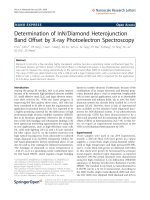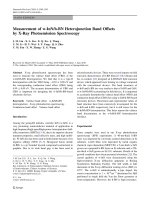IELTS Essays band 7-8 by Le Phuong
Bạn đang xem bản rút gọn của tài liệu. Xem và tải ngay bản đầy đủ của tài liệu tại đây (89.09 KB, 9 trang )
IELTS TASK 2 – Band 7-8
TOPIC 1: Some children can learn more efficiently by watching TV. Therefore,
children should watch TV regularly both in school and at home? Do you agree or
disagree? (At least 250 words)
Many people have been concerned about the educational effects of television. While watching
TV can help children study more effectively, I strongly disagree that they should be allowed to
watch TV frequently both in school and at home.
On the one hand, the introduction of the television at home as well as in educational institutes
can bring some benefits to the youngsters. First, it is not deniable that television has a
powerful influence on children’s awareness because of its wide range of interesting and even
inspiring programs. Especially, keeping education as a parental priority in mind, more and
more television channels have targeted children by producing many specific educational
programs to help reinforce class work. Second, research suggests that spending time on
watching television could increase focus and concentration. Television with its magical power
of mixing various forms of visual images and sounds stimulates school children’s curiosity and
creativity so that they can learn more productively.
On the other hand, I believe that watching television can turn out to be significantly harmful if
it is not under appropriate control. Without careful supervision, children tend to choose as
their favorite TV programs some which are solely designed for entertaining purposes with
much violence and inappropriate language. Such unsuitable programs might leave a bad
impact on their immature brains and contribute to their negative behavior subsequently. In
addition, TV viewing can take away the time that kids need to develop important social skills
through conversation and other activities. Moreover, excessive TV watching will probably
discourage school children from reading books and other informative material. As a result,
children’s cognitive and problem solving ability will be affected.
In conclusion, while it is true that through watching TV, children can gain invaluable
informational and educational knowledge, in my opinion, TV viewing time should be restricted
and under the supervision of parents and teachers.
Question 2: Some people think that schools should reward students who show the
best academic results, while others believe that it is more important to reward
students who show improvements. Discuss both views and give your own
opinion.
Some people believe that students with outstanding achievement should be
rewarded, while others are in favour of giving rewards to students who demonstrate
progress in learning so as to encourage them . My view is that we both of these
student groups should be praised.
On the one hand, we should recognize the achievement of gifted students for a
number of reasons. First, to accomplish good academic performance, even brilliant
students might have to invest a lot of time and effort in studying, so a reward will
give an acknowledgement of the effort they have made. Not being praised for their
exceptional performance might demotivate high achievers and slowly but surely
they might lose r interest in their studies. Second, students who achieve excellent
academic outcomes can set good example for other students to follow, and rewards
for outstanding achievement may promote learning among all students.
On the other hand, reward should also be given to low achievers who demonstrate
signs of progress because of the effort they have put into their work. . Immediate
encouragement can make students feel more determined to work harder to keep
pace with their fellow students. Furthermore, students lacking very high
achievement are more likely to feel demotivated just because of their lower levels
of performance. Consequently, when their efforts are valued they may gradually
become more confident and inspired to develop their capacity to work towards
achieving better results. This will have a positive long - term impact on the learning
process of weaker students and bring benefits to their learning process.
In conclusion, in my opinion, encouragement always raises motivation, and,
students whether with low or high level of competence, should be awarded for their
improvement as well as for excellent academic results.
Question 3: Some people think that in order to protect the environment, we
should reduce air travel. Do you agree or disagree?
Many people have been increasingly concerned about the harmful effects of the
increasing volume air transport. I strongly agree that we should reduce air travel in
order to safeguard the environment.
To begin with, the increasing demand for air travel has significantly contributed to
environmental damage and global warming. Compared to other modes of transport,
such as cars or trains, planes account for the highest level of carbon dioxide
emissions released to the atmosphere. In effect, the huge increase in air pollution,
with bad effects on human and animal health, is significantly due to the rapid
growth in air transport. What is more, exhaust fumes from planes are also the
greatest source of greenhouse gases leading to global warming and climate change
which are perhaps the greatest threat to life on earth.
There are those who argue, however, that air travel is essential for global commerce
and business people. They point out that in such case passengers cannot depend on
other means of transport and the benefits of travelling by air are indisputable.
Nonetheless, it is my belief that such alternatives as teleconferencing can reduce the
need for business flights. In addition, advocates of the aviation industry claim that a
number of measures have been being taken to reduce the amount of carbon
emissions by modern aircraft. However, the potential for eco-friendly flying looks
rather limited because of the huge time, cost and coordinated effort needed to bring
it about. It is therefore an impractical solution for the immediate and urgent problem
of reducing pollution and climate change.
Taking these points into consideration, I agree that there should be reduction in the
use of air traveling if human beings want to avoid destroying the environment in
which they live.
Question 4: Young people are often influenced in their behaviors and situations
by others in the same age. This is called "peer pressure". Do the disadvantages
outweigh the advantages?
It is true that many young people are easily influenced by their peers. While I accept
that this can sometimes have a positive effect on children, I believe that it is more
likely to have a harmful impact.
On the one hand, the influence from peers can sometimes be beneficial to
youngsters. First, peer pressure might help young adults reflect on their actions and
amend their ways to become a better individual . Observing others working hard to
achieve their goals will definitely encourage teenagers to put more effort into their
own targets. For instance, when a teenager knows that his teammates are practising
hard to become better basketball players, it will directly affect his own performance.
Second, peer pressure can provide wider perspectives on the world young people
are living in. The most efficient way to acquire new knowledge and useful skills is
to learn from the peers that they socialize with.
On the other hand, peer pressure can be a very destructive force. Mixing with bad
company means that teenagers can be influenced by bad habits such as taking
drugs, smoking and drinking. Furthermore, peer pressure can discourage
adolescents from thinking independently. In some cases, they have to think and act
like the whole group or they may even have to seek acceptance from their peers
before making up their mind. Extreme peer pressure may lead youngsters to follow
what their peers feel is right, resulting in a loss of independence in thought and
behaviour.
To sum up, I feel that peer pressure has more negative impact, even though it can
sometimes be beneficial to the all-round development of an individual.
Question 5: Some countries have introduced a law to limit working hours for
employees. Why is this law introduced? Do you think it is a positive or a
negative development?
It is true that a law to restrict working hours has been established in several
countries for some reasons. This implementation has affected employers and
employees in various ways and in my opinion there are both positive and negative
effects.
The introduction of a law to limit working hours has a range of effects, both
beneficial and negative, for employers and employees.
There are two motives for such legislation: to prevent exploitation and to create
more job availability. In countries where there is no such law, employees are more
open to exploitation, and instead of a normal working day, they may be compelled
to do physically demanding and dangerous jobs beyond what is reasonable, and
with little or even no extra pay. Restricting maximum working hours is a way to
protect the rights of employees in the workplace. Another benefit is the creation of
more employment, so providing greater opportunitiesfor more people to get a job.
Applying such a law can benefit both employees and employers. Restriction on
working time helps members of staff achieve a better work-life balance.
For
example, they will find time for their regular exercise and for family life if working
hours are fixed. This can contribute positively to improvement in their physical and
mental health. When employees have better health, their productivity will increase
and hence this may improve the efficiency and profitability of their organization.
However, the limitation of working time can also have a negative effect on the
business. With employees working fewer hours, it may be necessary to employ
more people in order to remain competitive. Increasing the number of employees
may affect profitability. This could lead employers to reduce pay, which in turn
could lead to employee dissatisfaction and turn over.
In conclusion, it seems to me that while limiting hours of work can create a more
encouraging working environment, not all of the outcomes will be positive.
TOPIC 6: In many countries nowadays, young single people no longer stay
with their parents until they are married, but leave to study or work
somewhere else. Do you think this trend has more advantages or
disadvantages?
It is common nowadays for the young generation nowadays to leave their families before
marriage in order to pursue higher education or their career. I would like to argue that the
advantages of this trend outweigh its disadvantages.
On the one hand, there are some drawbacks when adolescents have to live on their
own. One of the difficulties they might encounter is homesickness, which sometimes
discourages them from carrying on their work duties or studying. Similarly, the parents
who are left behind may feel abandoned and lonely. In addition, without the supervision,
care and guidance of family members, young people are more likely to form bad habits
such as excessive drinking of alcohol or living beyond their means.
On the other hand, leaving home before getting married is beneficial for financial as well
as personal growth. First, young people can learn the value of money by earning and
spending on their own and dealing with financial problems. Second, staying far away
from parents will potentially enhance youngsters’ independence and responsibility.
When being given the opportunity to explore the world and get valuable experience of
life, they are required to make their own decisions. As a result, this promotes their
maturity and helps them be ready to start their future married life with greater maturity.
Furthermore, the isolation of individuals from home also provides young people with
better social skills because they will have to build more relationships if they want to
survive successfully in a new environment
In conclusion, I would argue that the benefits of leaving home for education or working
purposes outweigh the negative aspects.
Question 7: Developments in technology have brought various environmental
problems. Some believe that people need to live simpler lives to solve
environmental problems. Others, however, believe technology is the way to
solve these problems. Discuss both views and give your own opinion.
The environment has been badly affected by the effects of human activities and
associated technology. Some people argue that we should lead simpler lives to
reduce environmental problems, while others believe these problems can be dealt
with by using modern technology. This essay will discuss both views and draw a
final conclusion.
On the one hand, living simpler lives could be an effective solution to
environmental issues. If people do not depend excessively on technological
advances such as motor vehicles and aircraft, environmental problems like noise
and air pollution or air pollution will be reduced. As a matter of fact, a generation
ago, the environment was in better condition without modern transportation. There
is no doubt that motor vehicle emissions are a major cause of atmospheric pollution.
In the past, people traveled on foot or used animals for transport, without using
fossil fuels which are a cause of much pollution. Moreover, leading simpler lives
means that humans will not consume such a variety of products, resulting in less
industrial pollution from factories and power plants. Furthermore, with fewer
industrial zones, there which be a reduction in river and land pollution, contributing
to a greener and fresher environment.
Despite less dependence on technology might seem a good solution, in some cases,
modern technology could help to tackle environmental problems. Thanks to the
technological development, new ways of protecting the environment can be
discovered and developed. For example, nowadays, people are able to exploit
sources of renewable energy such as wind and solar power which cause no harm to
the environment. Moreover, the increase in recycling waste turns garbage into new
uses which benefit people’s lives. For instance, millions of bottles are recycled each
year and this helps reduce the amount of rubbish accumulated on the land.
In conclusion, advanced technologies have environmental advantages and
disadvantages. In my opinion, people should employ technology wisely to diminish
its harmful effects on the environment.
Question 8: Friends and family bring more happiness than money and
possessions. How far do you agree with this statement?
Solid friendships and strong family bonds can have an enormous cumulative effect
on the quality of our lives. I would argue that a close circle of friends and family is
more important for individual happiness than money and possessions.
Spending time with friends and members of family can provide a multitude of longterm physical and mental health benefits. First, maintaining constructive
relationships would encourage healthy eating and regular exercise as a necessary
investment in a person’s health. This is because meaningful personal ties lead to
more positive emotions, which in turn may actually boost a person’s appetite for
food and motivate them to carry on physical activity. Second, studies show that
healthy relationships make people’s lives more enjoyable, reduce the physical signs
of stress and lessen grief. For instance, a classmate who lost her baby during
pregnancy said that she was better able to cope with her pain after receiving social
support from her friends and family. As a result, those who are frequently socially
engaged with friends and family throughout their life are happier compared to
people who, though wealthier and with more possessions, live alone.
A circle of close friends and family members provides camaraderie to help
individuals achieve personal goals and have success in life. Relationships help
people feel that they are worthy and capable of setting goals and accomplishing
them. For example, with the encouragement and practical help from his
underprivileged family, Nguyen Huu Tien passed the entrance exam for Hanoi
Medicine University with the top scores in 2013. Some people might feel that
money can enable them to buy high quality education and even the highest position
in a company. However, I believe, only talent and hard work would bring lifelong
success which wealth could not make possible.
In conclusion, I believe that true happiness lies in rewarding relationships, and that
wealth and material possessions do not provide the same level of contentment.









